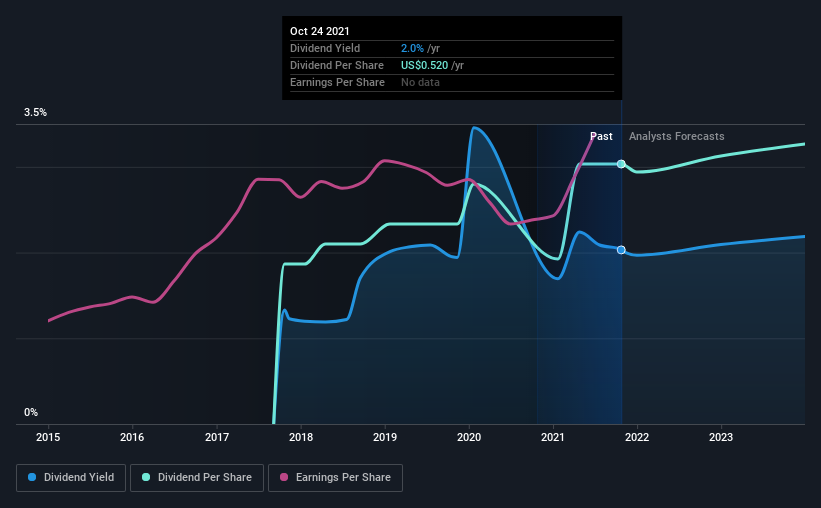Is It Smart To Buy RBB Bancorp (NASDAQ:RBB) Before It Goes Ex-Dividend?
RBB Bancorp (NASDAQ:RBB) stock is about to trade ex-dividend in 3 days. Typically, the ex-dividend date is one business day before the record date which is the date on which a company determines the shareholders eligible to receive a dividend. The ex-dividend date is an important date to be aware of as any purchase of the stock made on or after this date might mean a late settlement that doesn't show on the record date. This means that investors who purchase RBB Bancorp's shares on or after the 29th of October will not receive the dividend, which will be paid on the 12th of November.
The company's next dividend payment will be US$0.13 per share, and in the last 12 months, the company paid a total of US$0.52 per share. Looking at the last 12 months of distributions, RBB Bancorp has a trailing yield of approximately 2.0% on its current stock price of $25.6. We love seeing companies pay a dividend, but it's also important to be sure that laying the golden eggs isn't going to kill our golden goose! As a result, readers should always check whether RBB Bancorp has been able to grow its dividends, or if the dividend might be cut.
See our latest analysis for RBB Bancorp
Dividends are typically paid out of company income, so if a company pays out more than it earned, its dividend is usually at a higher risk of being cut. RBB Bancorp has a low and conservative payout ratio of just 20% of its income after tax.
Generally speaking, the lower a company's payout ratios, the more resilient its dividend usually is.
Click here to see the company's payout ratio, plus analyst estimates of its future dividends.
Have Earnings And Dividends Been Growing?
Companies with consistently growing earnings per share generally make the best dividend stocks, as they usually find it easier to grow dividends per share. If earnings decline and the company is forced to cut its dividend, investors could watch the value of their investment go up in smoke. Fortunately for readers, RBB Bancorp's earnings per share have been growing at 18% a year for the past five years.
Another key way to measure a company's dividend prospects is by measuring its historical rate of dividend growth. RBB Bancorp has delivered 13% dividend growth per year on average over the past four years. Both per-share earnings and dividends have both been growing rapidly in recent times, which is great to see.
To Sum It Up
Should investors buy RBB Bancorp for the upcoming dividend? Companies like RBB Bancorp that are growing rapidly and paying out a low fraction of earnings, are usually reinvesting heavily in their business. Perhaps even more importantly - this can sometimes signal management is focused on the long term future of the business. In summary, RBB Bancorp appears to have some promise as a dividend stock, and we'd suggest taking a closer look at it.
While it's tempting to invest in RBB Bancorp for the dividends alone, you should always be mindful of the risks involved. For example, we've found 2 warning signs for RBB Bancorp that we recommend you consider before investing in the business.
A common investment mistake is buying the first interesting stock you see. Here you can find a list of promising dividend stocks with a greater than 2% yield and an upcoming dividend.
This article by Simply Wall St is general in nature. We provide commentary based on historical data and analyst forecasts only using an unbiased methodology and our articles are not intended to be financial advice. It does not constitute a recommendation to buy or sell any stock, and does not take account of your objectives, or your financial situation. We aim to bring you long-term focused analysis driven by fundamental data. Note that our analysis may not factor in the latest price-sensitive company announcements or qualitative material. Simply Wall St has no position in any stocks mentioned.
Have feedback on this article? Concerned about the content? Get in touch with us directly. Alternatively, email editorial-team (at) simplywallst.com.

 Yahoo Finance
Yahoo Finance 
